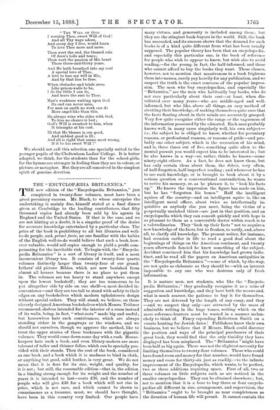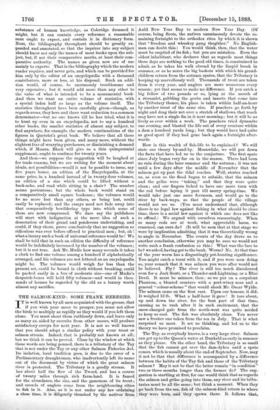THE " ENCYCLOPEDIA BRITANNICA."
THE new edition of the " Encyclopedia Britannica," just completed in twenty-four volumes, must have been a great pecuniary success. Mr. Black, to whose enterprise the undertaking is mainly due, himself stated at a final dinner given at Cambridge to the leading contributors, that fifty thousand copies had already been sold by his agents in England and the United States. If that is the case, and we are not hinting at a doubt, it is a singular proof of the desire for accurate knowledge entertained by a particular class. The price of the book is prohibitory to all but libraries and well- to-do people, and, prirad facie, no one familiar with the habits of the English well-to-do would believe that such a book, how- ever valuable, would sell copies enough to yield a profit com- pensating for the inevitable risk. To begin with, the "Encyclo- paedia Britannica" is a sort of library in itself, and a most inconvenient library too. It consists of twenty-four quarto volumes distinctly larger than twenty-four of our grand- fathers' old picture Bibles, which are now banished from almost all houses because there is no place to put them in. The volumes are too heavy to stand anywhere except upon the lowest bookshelf ; they are too numerous to be put altogether side by side on one shelf—a most decided in- convenience—and they are too tall to stand with safety to their edges on any bookshelves which modern upholsterers design without special orders. They will stand, we believe, on those cleverly designed American bookshelves which Messrs. Triibner recommend, shelves intended for the interior of a room instead of its walls, being, in fact, " what-note" made big and useful ; but housewives hate such contrivances, which are always standing either in the gangways or the windows, and we should not ourselves, though we approve the method, like to trust the upper stories of these bookcases with the gigantic volumes. They would come down some day with a rush. House- keepers hate such a book, and even library-makers are more tolerant of taller and thinner folios, which can be specially pro- vided with their stands. Then the cost of the book, considered as one book, and a book which it is madness to bind in cloth, or anything but good, solid leather, is very great. We do not mean that it is dear for its size, weight, and quality, for it is not ; but still, the reasonable edition—that is, the edition in a binding strong enough for its weight and the number of years it is intended to last—costs £36, and the number of
people who will give £36 for a book which will not rise in price, which is not rare, and which cannot be shown to
connoisseurs as a treasure, must, we should have thought, have been in this country very limited. Our people have many virtues, and generosity is included among them ; but they are the stingiest book-buyers in the world. Still, the book has succeeded, and its success shows that the demand for such books is of a kind quite different from what has been usually supposed. The popular theory has been that an encyclopedia, and especially this particular one, is the book of reference for people who wish to appear to know, but wish also to avoid reading,—for the young, in fact, the half-informed, and those who cannot afford to buy the books they want. Those classes, however, not to mention that massiveness in a book frightens them into nausea, rarely pay heavily for any publication, and we suspect the truth is the exact converse of the popular impres- sion. The men who buy encyclopedias, and especially the " Britannica," are the men who habitually buy books, who do not care particularly about their cost—at least, when dis- tributed over many years—who are middle-aged and well- informed, but who like, above all things, an easy method of rivetting their knowledge, of making themselves quite sure that the facts floating about in their minds are accurately grasped. Very few quite recognise either the range or the vagueness of the information possessed by the educated. Each man probably knows well, in many cases singularly well, his own subject- i.e., the subject he is obliged to know, whether for pecuniary reasons, or professional reasons, or reasons of pride—and pro- bably one other subject, which is the recreation of his mind, and is, three times out of five, something quite alien to the mental pursuit you would expect him to be interested in ; but he also knows in a way—or, rather, thinks he knows—some ninety-eight others. As a fact, he does not know them, but has only certain ideas about them, the debris, very often, of half-forgotten, half-imperfect reading ; and whenever he has to use such knowledge, or is brought to book about it by a serious question or a conversational contradiction, he wants to revive his memory, or, as he phrases it, to " look his facts up." He knows the impression the figure has made on him, but he has "forgotten his bones." Half the intelligent squires of the country—and an intelligent squire is, like an intelligent naval officer, about twice as intellectually in- quisitive as anybody else you meet, being the victim of a perpetually unslaked thirst—are just in that position, and an encyclopaedia which they can consult quickly and with hope is as pleasant to them as a conversible doctor within reach is to a valetudinarian. They "look up their facts " not to acquire a. new knowledge of the facts, but to freshen, to verify, and, above all, to clarify old knowledge. The present writer, for instance, had occasion earlier in life to read a good deal about the beginnings of things on the American continent, and twenty years afterwards fancied he knew something of the subject. Accident convinced him that his knowledge had grown indis- tinct, and he read all the papers on American antiquities in the " Encyclopedia Britannica "—some of which, by-the-way, are not quite as elaborate as they should be—with an interest impossible to any one who was desirous only of fresh information.
It is mature men, not students, who like the " Encyclo- paedia Britannica;" they gradually recognise it as a mine of suggestion and knowledge, and they have both the means and, what is much scarcer, the patience to buy it for themselves. They are not deterred by the length of any essay, and they —and we suspect they only—are attracted by the mass of admirable writing in the huge tomes, writing which on the mere reference-hunters must be wasted in a manner melan- choly to think of. Fancy expending Robertson Smith on a curate hunting for Jewish dates ! Publishers know their own business, but we believe that if Messrs. Black could discover the position and ways of the principal purchasers of their great book, they would find that the only timidity they have displayed has been misplaced. The " Britannica "might have been half as big again. There was not the slightest necessity for limiting themselves to twenty-four volumes. Those who could have found room and money for that number, would have found money and room for thirty-six just as readily,—to the infinite improvement of the Encyclopedia, which wants, to be perfect, two or three additions requiring space. First of all, two or three volumes on little subjects such as are noticed in the smaller encyclopaedias. They can be obtained elsewhere ; but, not to mention that it is a bore to buy three or four encyclo- paedias all different in size, arrangement, and supervision, the " Britannica " ought to be brought as near completeness as the duration of human life will permit. It cannot contain the substance of human knowledge, as Coleridge dreamed it might, but it can contain every reference a reasonable man ought to expect, and contain it in dictionary form. Next, the bibliography throughout should be greatly ex- panded and annotated, so that the inquirer into any subject should know not only the names of most books upon the sub- ject, but, if not their comparative merits, at least their com- -parative authority. The names as given now are of use mainly to experts. That is the bibliography which the modern reader requires, and never gets, and which can be provided for him only by the editor of an encyclopaedia with a thousand contributors, more or less, at his disposal. Such an addi- tion would, of course, be enormously troublesome and very expensive ; but it would add more than any other to the value of what is intended to be a monumental book- And then we want an entire volume of statistics, with a special index half as large as the volume itself. The statistics throughout have been carefully given—though, as regards areas, they here and there want reduction to a common denominator—but no one knows till he has tried, what it is to hunt up even in an encyclopzedia, not to say a hundred other books, the smaller statistics of almost any subject, to find anywhere, for example, the modern continuations of the figures in Quetelet's great book. We believe that all these things might have been given, and many more, without the slightest fear of wearying purchasers, or diminishing a demand which, if Messrs. Black will give us a thin quinquennial supplement, ought to continue for twenty years.
And then—we suppose the suggestion will be laughed at for trade reasons, but we are writing for the moment about ideals, not possibilities—would it not be possible to issue, say five years hence, an edition of the EncyclopEedia, at the same price, in a hundred instead of in twenty-four volumes, an edition of a size which could be lifted without a back-ache, and read while sitting in a chair ? The number seems portentous ; but the whole book would stand on a comparatively small square bookcase ; the volumes would be no more lost than any others, or being lost, could easily be replaced; and the essays need not fade away into that comparatively bewildering type into which some of them are now compressed. We dare say the publishers will start with indignation at the mere idea of such a desecration of their grand and ponderous undertaking, and could, if they chose, prove conclusively that no suggestion so ridiculous was ever before offered to practical men ; but, oh ! what a luxury such a book of universal reference would be ! We shall be told that in such an edition the difficulty of reference would be indefinitely increased by the number of the. volumes ; but it is not true. Ask Mr. Mudie how many seconds it takes a clerk to find one volume among a hundred if alphabetically arranged, and his volumes are not lettered as an encyclopaedia might be. The volumes would weigh far less than the present set, could be bound in cloth without breaking, could be packed easily in a box of moderate size—one of Mudie's despatch-boxes will hold fifty volumes—and would in thou- sands of houses be regarded by the old as a luxury worth almost any sacrifice.















































 Previous page
Previous page